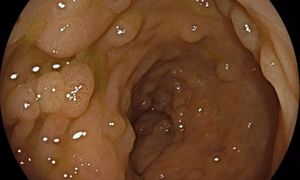Colorectal cancer screening in patients with FAP using artificial intelligence


Familial adenomatous polyposis (FAP) is an autosomal dominant disease that causes numerous adenomatous colonic polyps. If left untreated, patients are prone to develop colorectal carcinomas (CRC), making it the second most common hereditary CRC syndrome. Endoscopic monitoring with polypectomies can delay the need of surgery that poses significant morbidity and life-long possible consequences such as infertility. However, it is still indicated in cases of endoscopically uncontrollable polyposis, which is subjectively determined by the number and size of polyps. Therefore, it is difficult to define the optimal timing of the necessary prophylactic surgery. Computer-assisted polyp detection (CADe) systems are not specifically designed for colonic polyposis. This project proposes a specialized system for colon polyposis able to identify and count the number of polyps.
The project will be performed in close collaboration with the Department of Internal Medicine I and National Center for Hereditary Tumor Syndromes, University Hospital Bonn, Bonn, Germany.
It is funded by the Wilhelm Sander Foundation, Germany.





